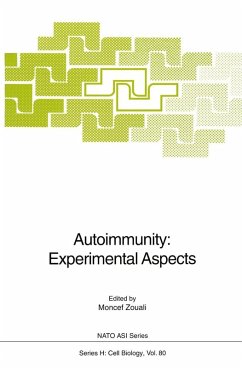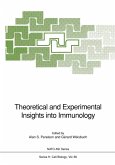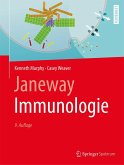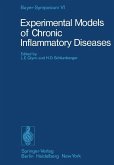Autoimmunity: Experimental Aspects (eBook, PDF)
Redaktion: Zouali, Moncef
73,95 €
73,95 €
inkl. MwSt.
Sofort per Download lieferbar

37 °P sammeln
73,95 €
Als Download kaufen

73,95 €
inkl. MwSt.
Sofort per Download lieferbar

37 °P sammeln
Jetzt verschenken
Alle Infos zum eBook verschenken
73,95 €
inkl. MwSt.
Sofort per Download lieferbar
Alle Infos zum eBook verschenken

37 °P sammeln
Autoimmunity: Experimental Aspects (eBook, PDF)
Redaktion: Zouali, Moncef
- Format: PDF
- Merkliste
- Auf die Merkliste
- Bewerten Bewerten
- Teilen
- Produkt teilen
- Produkterinnerung
- Produkterinnerung

Bitte loggen Sie sich zunächst in Ihr Kundenkonto ein oder registrieren Sie sich bei
bücher.de, um das eBook-Abo tolino select nutzen zu können.
Hier können Sie sich einloggen
Hier können Sie sich einloggen
Sie sind bereits eingeloggt. Klicken Sie auf 2. tolino select Abo, um fortzufahren.

Bitte loggen Sie sich zunächst in Ihr Kundenkonto ein oder registrieren Sie sich bei bücher.de, um das eBook-Abo tolino select nutzen zu können.
Combining principles of contemporary immunology with applications to immunopathology, this up-to-date volume documents new developments in the understanding of the origin of autoimmune diseases. Emphasized are cellular and molecular approaches in both organ-specific and systemic autoimmunity. A comprehensive bibliography, numerous illustrations, and tables make it an invaluable source of information for immunologists, rheumatologists, pathologists, dermatologists, and nephrologists.
- Geräte: PC
- ohne Kopierschutz
- eBook Hilfe
- Größe: 41.38MB
Andere Kunden interessierten sich auch für
![Immune Mediated Diseases (eBook, PDF) Immune Mediated Diseases (eBook, PDF)]() Immune Mediated Diseases (eBook, PDF)161,95 €
Immune Mediated Diseases (eBook, PDF)161,95 €![Theoretical and Experimental Insights into Immunology (eBook, PDF) Theoretical and Experimental Insights into Immunology (eBook, PDF)]() Theoretical and Experimental Insights into Immunology (eBook, PDF)137,95 €
Theoretical and Experimental Insights into Immunology (eBook, PDF)137,95 €- -21%11
![Janeway Immunologie (eBook, PDF) Janeway Immunologie (eBook, PDF)]() Kenneth MurphyJaneway Immunologie (eBook, PDF)86,99 €
Kenneth MurphyJaneway Immunologie (eBook, PDF)86,99 € ![Volume 4 Immunopathology (eBook, PDF) Volume 4 Immunopathology (eBook, PDF)]() Volume 4 Immunopathology (eBook, PDF)73,95 €
Volume 4 Immunopathology (eBook, PDF)73,95 €![Germ-Free Biology Experimental and Clinical Aspects (eBook, PDF) Germ-Free Biology Experimental and Clinical Aspects (eBook, PDF)]() Edwin A. MirandGerm-Free Biology Experimental and Clinical Aspects (eBook, PDF)73,95 €
Edwin A. MirandGerm-Free Biology Experimental and Clinical Aspects (eBook, PDF)73,95 €![Experimental Models of Chronic Inflammatory Diseases (eBook, PDF) Experimental Models of Chronic Inflammatory Diseases (eBook, PDF)]() Experimental Models of Chronic Inflammatory Diseases (eBook, PDF)73,95 €
Experimental Models of Chronic Inflammatory Diseases (eBook, PDF)73,95 €![Experimental Hematology Today (eBook, PDF) Experimental Hematology Today (eBook, PDF)]() Siegmund J. BaumExperimental Hematology Today (eBook, PDF)40,95 €
Siegmund J. BaumExperimental Hematology Today (eBook, PDF)40,95 €-
-
-
Combining principles of contemporary immunology with applications to immunopathology, this up-to-date volume documents new developments in the understanding of the origin of autoimmune diseases. Emphasized are cellular and molecular approaches in both organ-specific and systemic autoimmunity. A comprehensive bibliography, numerous illustrations, and tables make it an invaluable source of information for immunologists, rheumatologists, pathologists, dermatologists, and nephrologists.
Dieser Download kann aus rechtlichen Gründen nur mit Rechnungsadresse in A, B, BG, CY, CZ, D, DK, EW, E, FIN, F, GR, HR, H, IRL, I, LT, L, LR, M, NL, PL, P, R, S, SLO, SK ausgeliefert werden.
Produktdetails
- Produktdetails
- Verlag: Springer Berlin Heidelberg
- Seitenzahl: 302
- Erscheinungstermin: 29. Juni 2013
- Englisch
- ISBN-13: 9783642787799
- Artikelnr.: 53102582
- Verlag: Springer Berlin Heidelberg
- Seitenzahl: 302
- Erscheinungstermin: 29. Juni 2013
- Englisch
- ISBN-13: 9783642787799
- Artikelnr.: 53102582
- Herstellerkennzeichnung Die Herstellerinformationen sind derzeit nicht verfügbar.
1. Thymic Selection and Peripheral T cell Tolerance.- Tolerance induction in mature peripheral T cells.- Transgenic mice carrying the rearranged T cell receptor of a diabetogenic T cell clone.- The maintenance and reestablishment of self tolerance: T cell receptor (TCR) peptide-specific regulatory T cells.- Prevention of gastric autoimmunity by transgenic expression of a proton pump subunit in the thymus.- 2. B-cell repertoire selection.- The anti-self B-cell repertoire.- In vivo suppression of IgG2ab production accomplished by CD4+8? Th1 cell clones specific for a ?2ab allopeptide determinant.- 3. Targets of the autoimmune response.- Expression cloning using antibodies from a patient with rheumatoid arthritis of an autoantigen homologous to the Drosophila splicing regulator, suppressor-of-white-apricot.- Use of synthetic peptides for the analysis of B-cell epitopes in autoantigens.- Molecular mimicry as a mechanism of induction of autoantibodies.- The expression of heat shock proteins in systemic lupus erythematosus.- 4. Trigger Mechanisms of autoantibody production.- The Heavy chain variable region genes of human lupus autoantibodies.- Molecular analysis of anti-dsDNA autoantibodies from patients with systemic lupus erythematosus.- Differential usage of an autoantibody-associated VH gene by human B-cell tumors.- Idiotypes of DNA-binding autoantibodies: mapping by epitope scanning and molecular modelling.- 5. T Cell Receptor Genes.- T cell receptor variable gene repertoire in rheumatoid synovial T cells responding to BCG.- An analysis of T cell receptor diversity in the NOD mouse: What can it tell us about the autoimmune process?.- Possible linkage of Myasthenia Gravis susceptibility in R111 S/J mice to a genomic deletion of T cell receptor V? genes.- Genetic andenvironmental factors in systemic lupus erythematosus.- 6. Animal Models and Immunointervention.- Role of immunocompetent cells in skin sclerosis and autoimmunity in tight skin mice.- MRL/lpr mice as a model of autoimmune diseases: multiple strategies for immune intervention.- Major histocompatibility binding peptides: an experimental approach towards specific immunotherapy of autoimmune diseases.- Type-I (insulin-dependent) and type-II (non-insulin-dependent) diabetes mellitus in BC1 [(NOD × Mus spretus) F1 × NOD] mice.
1. Thymic Selection and Peripheral T cell Tolerance.- Tolerance induction in mature peripheral T cells.- Transgenic mice carrying the rearranged T cell receptor of a diabetogenic T cell clone.- The maintenance and reestablishment of self tolerance: T cell receptor (TCR) peptide-specific regulatory T cells.- Prevention of gastric autoimmunity by transgenic expression of a proton pump subunit in the thymus.- 2. B-cell repertoire selection.- The anti-self B-cell repertoire.- In vivo suppression of IgG2ab production accomplished by CD4+8? Th1 cell clones specific for a ?2ab allopeptide determinant.- 3. Targets of the autoimmune response.- Expression cloning using antibodies from a patient with rheumatoid arthritis of an autoantigen homologous to the Drosophila splicing regulator, suppressor-of-white-apricot.- Use of synthetic peptides for the analysis of B-cell epitopes in autoantigens.- Molecular mimicry as a mechanism of induction of autoantibodies.- The expression of heat shock proteins in systemic lupus erythematosus.- 4. Trigger Mechanisms of autoantibody production.- The Heavy chain variable region genes of human lupus autoantibodies.- Molecular analysis of anti-dsDNA autoantibodies from patients with systemic lupus erythematosus.- Differential usage of an autoantibody-associated VH gene by human B-cell tumors.- Idiotypes of DNA-binding autoantibodies: mapping by epitope scanning and molecular modelling.- 5. T Cell Receptor Genes.- T cell receptor variable gene repertoire in rheumatoid synovial T cells responding to BCG.- An analysis of T cell receptor diversity in the NOD mouse: What can it tell us about the autoimmune process?.- Possible linkage of Myasthenia Gravis susceptibility in R111 S/J mice to a genomic deletion of T cell receptor V? genes.- Genetic andenvironmental factors in systemic lupus erythematosus.- 6. Animal Models and Immunointervention.- Role of immunocompetent cells in skin sclerosis and autoimmunity in tight skin mice.- MRL/lpr mice as a model of autoimmune diseases: multiple strategies for immune intervention.- Major histocompatibility binding peptides: an experimental approach towards specific immunotherapy of autoimmune diseases.- Type-I (insulin-dependent) and type-II (non-insulin-dependent) diabetes mellitus in BC1 [(NOD × Mus spretus) F1 × NOD] mice.







